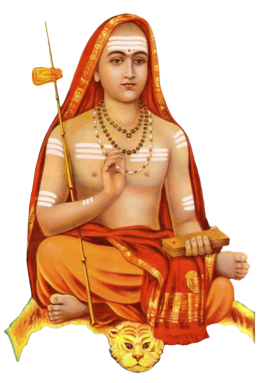यथा सूर्य एकोऽप्स्वनेकश्चलासु
स्थिरास्वप्यनन्यद्विभाव्यस्वरूपः
चलासु प्रभिन्नः सुधीष्वेक एव
स नित्योपलब्धिस्वरूपोऽहमात्मा ॥ ९॥
स्थिरास्वप्यनन्यद्विभाव्यस्वरूपः
चलासु प्रभिन्नः सुधीष्वेक एव
स नित्योपलब्धिस्वरूपोऽहमात्मा ॥ ९॥
yathā sūrya eko’psvanekaścalāsu
sthirāsvapyananyadvibhāvyasvarūpaḥ
calāsu prabhinnaḥ sudhīṣveka eva
sa nityopalabdhisvarūpo’hamātmā .. 9..
sthirāsvapyananyadvibhāvyasvarūpaḥ
calāsu prabhinnaḥ sudhīṣveka eva
sa nityopalabdhisvarūpo’hamātmā .. 9..
9. The one sun appears as many reflections in different containers of water, moving or still, but the sun remains unaffected by the nature of the water in which it is reflected. Similarly, the one Self, though reflected in different intellects that are ever-changing, remains changeless and untainted by the character of the intellects.
English Translation and Notes based on the Bhashya of Sri Sankara
Translated by S. N. Sastri
The Self (or Brahman) reflected in the intellect is the Jiva, or individual soul. The intellects vary in nature, but Brahman is ever the same and is not in the least affected by the characteristics of the intellects. The Jiva, through ignorance, identifies himself with the body-mind complex and attributes to himself the joys and sorrows of the body-mind complex. When the Jiva gives up his identification with the body-mind complex he realizes that he is Brahman.
Hastamalakiyam – Verse 9 – Hastamalaka-9-yathā sūrya – In Sanskrit with English Transliteration, Translation, Meaning and Bhashya – Commentary by Sankaracharya – Hastamalakiyam-9

